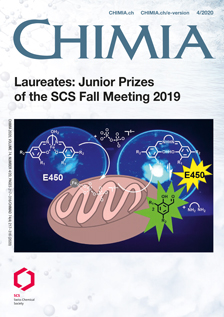Metal-Salen-based Probes for the Selective Detection of Phosphates via a Disassembly Approach
DOI:
https://doi.org/10.2533/chimia.2020.252PMID:
32331542Keywords:
Cell studies, Disassembly approach, Foodstuff, Phosphates, Salen complexAbstract
Polyoxophosphates are ubiquitous in nature and play important roles in biological systems and in the environment. Pyrophosphate (PPi), an important member of this family, is produced in over 200 biochemical reactions and is a marker in clinical diagnosis. In addition to its endogenous role, PPi alias E450 is currently used as preservative, emulsifier or taste intensifier in foodstuff. Despite this widespread occurrence and biological importance, it is rather surprising that robust chemical systems that detect selectively and sensitively PPi in challenging matrices are still lacking. This mini review focuses on metal-salen complexes as reaction-based fluorescent sensors for the selective detection of PPi and other phosphates. The mode of detection is based on a novel disassembly approach in which the metal ion is sequestered by the target analyte from the complex and the metal-free ligand hydrolyses spontaneously into its fluorescent subunits. Optimizations of the probe and applications for PPi detection in cells and foodstuff are described.Downloads
Published
2020-04-29
Issue
Section
Scientific Articles
License
Copyright (c) 2020 Prerna Yadav, Felix Zelder

This work is licensed under a Creative Commons Attribution-NonCommercial 4.0 International License.
How to Cite
[1]
P. Yadav, F. Zelder, Chimia 2020, 74, 252, DOI: 10.2533/chimia.2020.252.







